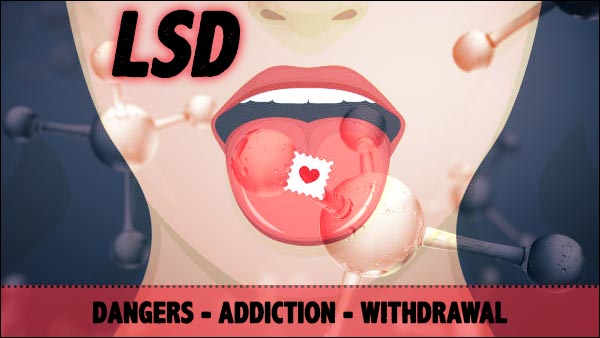During the 1960s, it was one of the most popular drugs used. Its ability to make users feel “at one” with the world immediately drew crowds.
But it wasn’t long before the government classified LSD as an illegal drug and the phrase “turn on, tune in and drop out” became antiquated. Even today, scientists are struggling to understand the drug’s effects, dangers and potential uses.
If you or a loved one is suffering from LSD addiction, this article provides everything you need to know.
How long does LSD stay in your system? Is it really a “safe” drug?
We’ll answer all your questions here.
Understanding the Drug
LSD stands for lysergic acid diethylamide, but it goes by many other names, as well:
- Acid
- Kool-aid
- California sunshine
It was first invented in Switzerland by chemist Albert Hofman to treat respiratory depression. Its psychedelic properties were discovered after Hofman accidentally got the drug on his skin.
LSD is taken orally and is tasteless, colorless and odorless. Only small doses are (initially) required to experience its effects.
How It Works
LSD affects the serotonin receptors in the brain, which help us perceive and interpret the world.
The visual hallucinations are caused by an over-stimulation of the visual cortex. New brain imaging software has shown individuals on LSD experience an “explosion of communication” in this area.
Blood flow to these locations also increases, causing further activity.
Effects
Acid is a psychedelic that creates hallucinations, sounds and feelings that seem real but aren’t. Generally, short-term effects begin about half an hour to 90 minutes after ingesting and last for half a day.
On acid, users “trip.” Trips vary in nature. Some are spiritual experiences while other users report feeling as though they were trapped in a nightmare.
Researchers speculate the effects rely heavily on the setting in which the drug is taken and on the mental health of the user.
Other short-term effects include:
- Vivid colors
- Heightened heart rate
- Increased blood pressure and temperature
- Dizziness
- Sleeplessness
- Sweating
- Tremors
- Mood shifts
Dangers
Not much is known about LSD’s long-term effects on health, and while many might think acid sounds like a “safe high,” quite the opposite is true.
LSD can cause permanent mental damage. Individuals prone to developing schizophrenia, for instance, may spur the illness into reality after taking a dose. Likewise, it can cause or worsen other mental health issues such as depression and anxiety.
When taken regularly, acid interferes with daily life, affecting an individual’s career, personal relationships and overall happiness.
In rare cases, LSD causes persistent psychosis and Hallucinogen Persisting Perception Disorder (HPPD). These disorders cause random flashbacks, hallucinations, paranoia, mood disturbances and other negative effects throughout one’s life.
Addiction
LSD is not a commonly abused drug. In fact, it is not physically addictive. However, psychological dependence is a real possibility.
When an individual regularly takes LSD, he or she builds a tolerance to the drug and to other hallucinogens. The individual will have to take more of it in order to achieve the same high, which is dangerous and, in some cases, life-threatening.
However, tolerance quickly erodes with only a few days of abstinence from this drug and users will not experience physical dependence. Consequently, when addiction occurs, it is a result of psychological dependence.
Withdrawal
Currently, there are no documented cases of physical withdrawal symptoms. However, for those addicted to the drug, the psychological dependence creates mental cravings for the high it provides.
Eventually, this dependence affects an individual’s thoughts, emotions and behavior. Once this psychological dependence is fortified, it becomes a dangerous habit that is very hard to break.
The severity of this psychological withdrawal ranges according to a user’s mental health, regular dose and frequency of use.
Possible withdrawal symptoms include:
- Anxiety
- Concentration problems
- Confusion
- Mood swings
- Depression
If you experience these symptoms, it’s important you seek professional help to safely get past your addiction.
How Long Does LSD Stay In Your System?
LSD metabolizes quickly. In fact, some studies indicate half of the acid leaves your system within five hours.
For most, the drug will be completely out of their system with a day or two, but traces may be found in the urine for up to five days. Acid traces can also be found in hair follicles for up to 90 days.
The length of time LSD remains in your system depends on several factors.
Dose
The more acid you consume, the longer it takes for your body to process it. Higher doses may take a few days to completely escape your system. In fact, 100 mcg of LSD can be detected with an RIA test at 30 hours.
Age
Younger individuals metabolize drugs (and food) faster than the elderly. In fact, by age 25 most individuals begin experiencing a slower metabolism at a 2% to 4% decreased rate every year.
By 65, blood circulation and metabolism decrease significantly, meaning the drug may stay in your body longer.
Weight
Individuals with lots of lean muscle metabolize foods and drugs quickly. Similar to alcohol, taller and heavier individuals tend to process LSD faster than shorter and lighter users.
Food Intake
As with alcohol, food intake can slow absorption times. If you eat with your dose of LSD, you may not process it as quickly. As a result, it stays in your body for a longer period, though this extra time is not extensive.
Genetics
Some people are born with a high metabolism. Others aren’t so lucky.
An easy way to tell is to consider how long it takes for a drug (even if it’s caffeine) to “kick in.” Those with a higher metabolism may experience effects within half an hour; for others, it could take much longer.
Those with a high metabolism will detox the LSD from their bodies at a quicker rate than those with a low metabolism.
Revive Your Mind and Body
Although LSD does not have the physical withdrawal symptoms and addiction of other drugs, users should not underestimate its potential effects. When psychological dependency occurs, it is the first domino in a long line of negative repercussions.
Being able to answer the questions “How long does LSD stay in your system?” and “What are its dangers?” honestly is the first step towards detox.
If you or a loved one is experiencing LSD dependency, it’s important you seek the help of a professional, caring service who will put your needs first.
At Revive, you will experience the professionalism you expect but in a residential, home-like atmosphere. Call us today to meet our team or discuss treatment for you or a loved one.
Revive yourself and revive your life.





